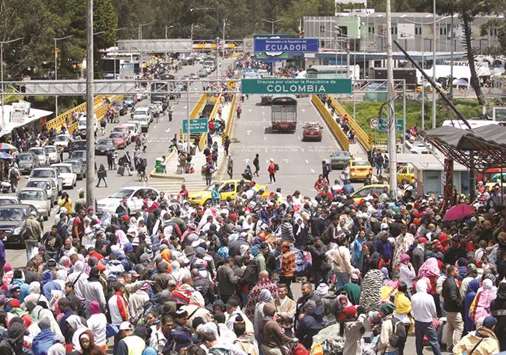Colombia and Brazil, which share borders with Venezuela, have borne the brunt of the regional humanitarian emergency brought on by the near total collapse of the Venezuelan economy.
But with the crisis deepening, the “influx is now accelerating” into Ecuador and beyond, with some people making arduous weeks-long journeys on foot before finding a place to settle, the United Nations refugee agency (UNHCR) said in Geneva.
“Since the beginning of the year, some 547,000 Venezuelans have entered Ecuador through the Colombian border,” UNHCR said, noting that most have continued onward to Peru and Chile.
“Many run out of resources to continue their journey and, left destitute, are forced to live rough in public parks and resort to begging in order to meet their daily needs,” the agency added.
UNHCR said Ecuador’s state of emergency declaration would help mobilise more resources and announced that the UN was also stepping up its regional response.
Venezuelan President Nicolas Maduro has tightened his grip over opponents whom he has branded as agents of a foreign-backed plot.
Caracas’s diplomatic isolation has intensified, with the country in the grip of staggering hyperinflation, shortages of food and medicine.
Meanwhile, Venezuela is pressing Colombia and the US to extradite its former National Assembly speaker as the country’s opposition pushed back on Thursday, saying the arrest warrant for the prominent lawmaker Julio Borges was “political in nature.”
Venezuela’s Supreme Court had on Wednesday ordered the arrest of Borges for “attempted murder,” suspecting his involvement in what officials said was a drone “assassination” attempt on Maduro.
The opposition-dominated legislature said the arrest warrant was “political in nature and should not be recognised by any foreign court.”
The National Assembly also denounced the “forced disappearance” of another lawmaker - Juan Requesens, who was seized by intelligence officers - demanding his “immediate release.”
The main opposition Justice First party later announced on Twitter intelligence agents had raided the homes of Borges and Requesens on Thursday night without warrants.
Former presidential candidate Henrique Capriles said he was concerned authorities may be tempted to plant evidence to incriminate them.
Venezuela’s superagency the Constituent Assembly announced on Wednesday it was stripping Borges and Requesens of their parliamentary immunity, as the president accused the opposition of being behind the alleged assassination attempt against the president.
The government said seven soldiers were injured after two explosive-laden drones blew up in the confines of a military parade at the weekend.
Borges accused Maduro of “a set-up to persecute and convict anybody that opposes your dictatorship.”
The National Assembly said it would resist any attempt to remove its members’ immunity - but it has been left powerless by what the opposition described as a Maduro “coup.”
Maduro created the legislative Constituent Assembly - now the nation’s top authority - a year ago to effectively replace the opposition-dominated National Assembly.
Although the National Assembly is the only body under Venezuela’s constitution with the power to lift the immunity of individuals, it has been left impotent while the Constituent Assembly, filled exclusively with Maduro loyalists, reigns supreme.
In another development, Brazil has complained that Venezuela was doing nothing to stop the spread of an outbreak of measles in Brazil and other neighbouring countries that has been sparked by an exodus of Venezuelans.
Since February, four people - three of them Venezuelan - have died of measles in the remote Brazilian border state of Roraima where health authorities have confirmed 281 cases of the disease, mostly among children.
The outbreak has prompted the Brazilian government to launch a nationwide campaign to vaccinate 11mn children, plus adults who request it. Although many Brazilian children are already vaccinated against the disease, the vaccination rate has dropped since Brazil was declared free of measles in 2016.
Brazil’s Health Minister Gilberto Occhi said Venezuela had ignored Brazilian offers of assistance and vaccines and had not replied to requests for information to assess the extent of the epidemic.

